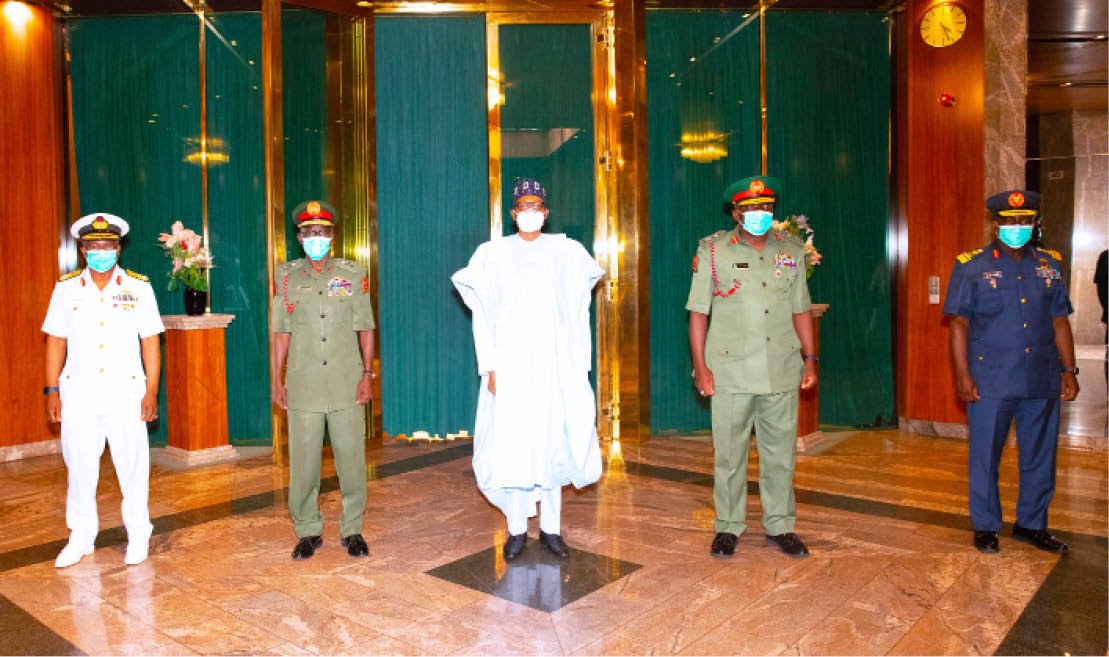Appointment of new service chiefs a welcomed development but…
When the presidency announced the retirement of the former Service Chiefs and the appointment of new ones

From left: Chief of Naval Staff, Rear Admiral Awwal Zubairu; Chief of Defence Staff, Maj-Gen Lucky Irabor; President Muhammadu Buhari; Chief of Army Staff, Maj-Gen Ibrahim Attahiru and Chief of the Air Staff, Air Vice Marshal Oladayo Amao after their meeting at the Presidential Villa Abuja
When the presidency announced the retirement of the former Service Chiefs and the appointment of new ones, there trailed a sense of renewed hope by Nigerians in the capacity of our Armed Forces to end the decade-long menace of insurgency, banditry, and pockets of violent clashes bedevilling the country, most especially the North-Eastern and North-Western regions.
We must, however, tread with caution in the level of hope we have now because this appointment – which may bring about positive change in our forces’ tactics and strategy in dealing with insecurity – seems like application of bandage on bullet wounds: well intentioned and perhaps fanciful, but ineffective in the long run. This is by no means an ill-thought condescension on the new chiefs and or the forces in general – their resolution in the face of fighting against an apathetic enemy hell-bent on causing sporadic destruction and leaving head-spinning death tolls in their wake, as well as the rising number of security agents paying the ultimate price, speaks volumes of what our Armed Forces go through – but a call on the government, and even the citizenry, to do more than just putting old wines in new bottles.
The first and perhaps most important step to take is complete rejuvenation of our educational system to provide proper education to young Nigerians who otherwise are prone to being easily radicalised. Even though educated people can also be radicalised, the chances of them being deceived with putrid ideologies are relatively low as they would have been properly informed and enlightened about, and experienced, the benefits of peaceful co-existence with other people of different backgrounds and orientations, and understood the demerits of having disdainful views of persons or ideas they do not align with. Hence, the government’s callous approach of budgeting meagre amounts for education needs to stop.
As someone who has had a short stint as a teacher in a government owned secondary school, the kind of education being provided to young Nigerians from low-income families is at best, average, and sometimes, borderline nonsensical.
We also have to make concerted efforts at ensuring that our religious scholars understand the gravity of using lines from religious scriptures to make inflammatory statements in their sermons. The disregard that our religious scholars have for other faiths is a major issue that must be looked into surgically, and necessary actions taken to put a stop to it, or at the very least, reduce it to hush-hush instead of brazen public statements.
As a Muslim, it would be ignoble to not acknowledge that some aspects of Islamic ideology are being followed by extremists, who consider themselves as the true harbingers of millenarianism, to unleash wanton terror on innocent civilians. Like it or not, the fact is that Nigeria is a multi-faith state and one must accept that reality as long as it does not constitute an impediment to one’s freedom to practice one’s religion.
Another step to take in tackling insecurity, especially as related to conflict, is to ensure that our media fully abide by the ethics of peace journalism that requires them to be key contributors to societal development and peaceful coexistence. They must begin to adhere to the tenets of peace journalism that leads audiences to have an increased understanding of conflicts, be less likely to have a polarised view of conflicts in which they believe that the side they align with is always right, have a higher level of optimism and compassion, and a decreased level of fear and anger.
Lastly, but of course not least, is to ensure that there is proper execution of the laws that stipulate the punishments for murders, kidnappings, and any other acts that put the lives of innocent persons at risk. The current method of giving feather smacks to the face of the perpetrators of extreme violence is surely proving to be abortive. While I am an advocate of rehabilitation and second chances, some persons are simply inexorable in their ways and it is high time we came to terms with that.
Isah Suleiman Kandi can be reached via [email protected]
